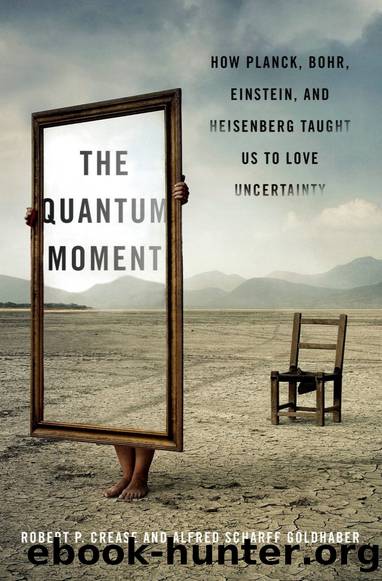The Quantum Moment: How Planck, Bohr, Einstein, and Heisenberg Taught Us to Love Uncertainty by Robert P. Crease

Author:Robert P. Crease [Crease, Robert P.]
Language: eng
Format: epub
ISBN: 9780393245998
Barnesnoble:
Goodreads: 23216117
Publisher: W. W. Norton & Company
Published: 0101-01-01T00:00:00+00:00
Reception
Many of Bohrâs colleagues, too, did not react well to the idea. It seemed to them to be philosophyâa term of opprobrium among physicistsâunnecessary at best and confusing and obstructive at worst. Jammer summarizes the general reaction of the Como audience to Bohrâs talk as that it âwill not induce any of us to change his opinion about quantum mechanics.â10 Schrödinger thought that Bohr was attempting to sweep difficult philosophical problems under the rug, writing that âBohr wants to âcomplement awayâ all difficulties.â11 The philosopher Karl Popper wrote, âI do not doubt that there is an interesting intuitive idea behind Bohrâs principle of complementarity. But neither he nor any other member of this school has been able to explain it.â12 Only a handful of other scientists were enthusiastic. J. Robert Oppenheimer remarked that complementarity was among the things that atomic physics has taught that âprovide us with valid and relevant and greatly needed analogies to human problems lying outside the present domain of science.â13 On the other hand, Oppenheimer also remarked that we have better and more traditional sources of insight to help us understand irresolution in the human world than quantum mechanics: âHamlet has said it better than Planckâs constant.â14
What were those supposedly relevant and needed analogies? Bohr was the first, and most diligent, at trying to identify them. He had a deep appreciation for philosophy and psychology, yet was frustrated by the inability of professionals in those fields to take what he thought was a serious interest in the new physics discoveries. He planned to write what some of his colleagues came to call âThe Book,â which would have been âa comprehensive presentation of complementarity and its implicationsâ throughout all aspects of human life.15 Historians have struggled to produce a clear picture of what might have been the contents of that book. In his biography of Bohr, Pais was stymied by his attempt to describe the significance of complementarity. He proceeded by writing a question and answer account of what generally happens when he attempts to teach complementarity to physicists. It includes the following exchange:
Q. All this about complementarity is very interesting. But of what use is it to me?
A. It will neither help you in your quantum mechanics calculations nor in setting up your experiment. In order to do physics you should not only assimilate and develop facts, however. In between you had better reflect on the meaning of what you are doing. In that respect Bohrâs considerations are extremely significant. Donât you agree it ought to matter to you what, for example, a modern scientist means or should mean when he talks about âa phenomenonâ? Note also that insights like these may serve to explain to interested laymen and to remind scientists what your profession is about.16
In the last line of his Nature article, Bohr spoke of complementarity as addressing a âgeneral difficultyâ in human ideas, hinting it had a wider application to other fields in which human beings are both actors and spectators. Noting this
Download
This site does not store any files on its server. We only index and link to content provided by other sites. Please contact the content providers to delete copyright contents if any and email us, we'll remove relevant links or contents immediately.
The Complete Stick Figure Physics Tutorials by Allen Sarah(7363)
Secrets of Antigravity Propulsion: Tesla, UFOs, and Classified Aerospace Technology by Ph.D. Paul A. Laviolette(5367)
Thing Explainer by Randall Munroe(3930)
The River of Consciousness by Oliver Sacks(3599)
The Order of Time by Carlo Rovelli(3188)
How To by Randall Munroe(3105)
A Brief History of Time by Stephen Hawking(3022)
I Live in the Future & Here's How It Works by Nick Bilton(2993)
What If?: Serious Scientific Answers to Absurd Hypothetical Questions by Randall Munroe(2700)
The Great Unknown by Marcus du Sautoy(2691)
Midnight in Chernobyl by Adam Higginbotham(2541)
Blockchain: Ultimate Step By Step Guide To Understanding Blockchain Technology, Bitcoin Creation, and the future of Money (Novice to Expert) by Keizer Söze(2484)
Networks: An Introduction by Newman Mark(2404)
The Meaning of it All by Richard Feynman(2350)
Easy Electronics by Charles Platt(2325)
The Tao of Physics by Fritjof Capra(2272)
Midnight in Chernobyl: The Untold Story of the World's Greatest Nuclear Disaster by Adam Higginbotham(2222)
Introducing Relativity by Bruce Bassett(2116)
When by Daniel H Pink(2114)
